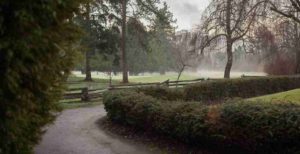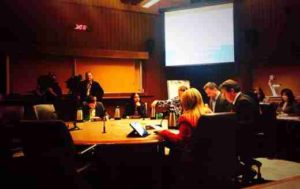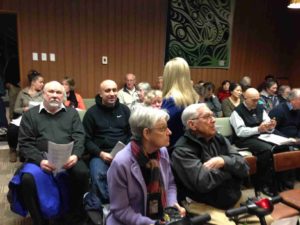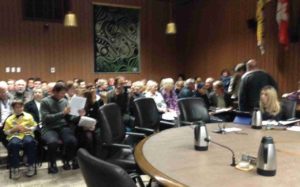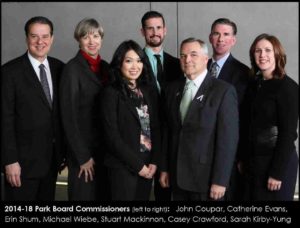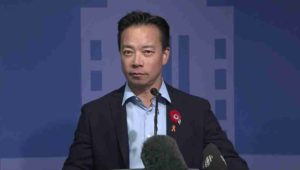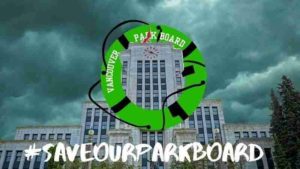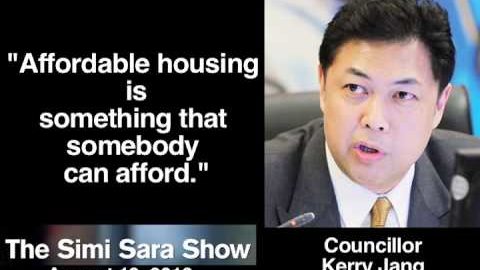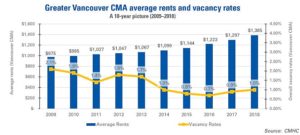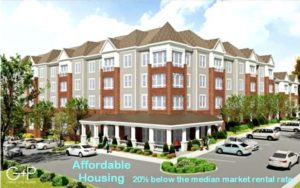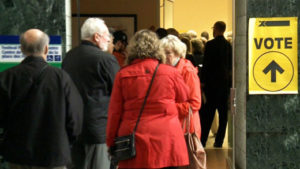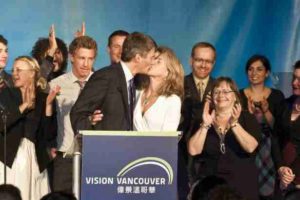
Vision Vancouver celebrates their overwhelming victory at the polls on November 19, 2011
Developers have long run the City of Vancouver, with various of the elected City Councils over the years acting as their all-too-willing handmaidens.
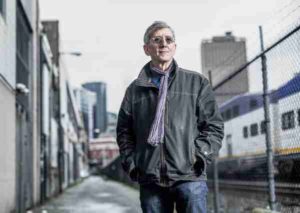
Joel Solomon, Vision Vancouver founder, standing outside, near his home in Railtown
The godfather and founder of the Vision Vancouver municipal party in 2004 was financier / philanthropist / real estate developer, and heir to a capitalist fortune, Tennessee émigré Joel Solomon, a political organizer who cut his teeth working on Jimmy Carter’s successful U.S. presidential campaign in the mid-1970s.
In the early 1990s, Solomon found his way to British Columbia, as he sought refuge on Cortes Island, while recovering from a serious health issue. In 1993, Solomon met a young organic farmer named Gregor Robertson. Their views aligned, especially on the urgent need to address climate change. The two became fast friends.
In 2002 Solomon made a decision to form a Vancouver civic party, which in time came to be called Vision Vancouver.
Recruiting Mike Magee from Stratcom — a strategic communications company dedicated to progressive causes — working with Magee, Solomon promised the then Coalition of Progressive Electors (COPE) Councillors Raymond Louie, Tim Stevenson and Jim Green their political futures lay with his newly-formed Vision Vancouver civic party, committing to them that he would dedicate substantial financial resources to their re-election in 2005’s Vancouver municipal election.
Long story short — following the untimely death of Jim Green, who was Vision Vancouver’s Mayoral candidate in the 2005 civic election — in 2006, Joel Solomon recruited his friend Gregor Robertson to seek the nomination to become the Mayoral candidate for Vision Vancouver in our city’s 2008 municipal election.
The rest is history: Vision Vancouver became government, from 2008 through 2018.

Gregor Robertson, Mayor in the City of Vancouver, from November 15, 2008 through October 20, 2018
Upon assuming government at Vancouver City Hall in 2008, Joel Solomon was quick to establish a secretive, behind-the-scenes “Mayoral advisory Board” — most members of which were not only longtime friends of Solomon’s dating back to his days in Tennessee, but were, as well, extremely successful real estate developers.

During their time in government, 12 development-related lawsuits were filed against Vision Vancouver
Over the course of their years in power, there were a number of development-related lawsuits that were filed against Vision Vancouver.
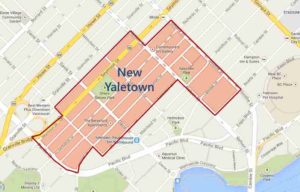
Perhaps the most egregious — and many thought, corrupt — development-related failing by Vision Vancouver involved a legal petition filed with the BC Supreme Court on May 6, 2014, by the Community Association of New Yaletown, to prevent a mega-tower development on the city block containing Emery Barnes Park.
The legal petition alleged the City, in approving development of the 36-storey tower at 508 Helmcken St. and a related building across the street at 1099 Richards Street violated the Downtown Official Development Plan (DODP) bylaws in in numerous and significant ways, while thwarting the long-planned expansion of Emery Barnes Park “to help reduce the City’s significant shortfall in meeting its own green space targets in the area.”
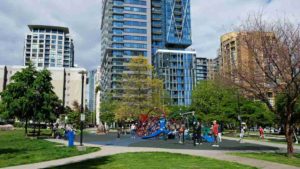
Emery Barnes Park, in the heart of New Yaletown, adjacent to Davie and Seymour streets
That Vision Vancouver had not consulted with the community, nor even made any mention of their plans to build yet another mega-tower in the New Yaletown neighbourhood — a “favour” to the Tennessee-based developer, Brenhill Development, who just happened to be friends with Joel Solomon, and members of the Mayoral Advisory Board — exacerbated not only the ire of residents of New Yaletown, but esteemed British Columbia Supreme Court Justice Mark McEwan, who ruled in favour of the New Yaletown residents, “killing the New Yaletown development”, even though it was already under construction.
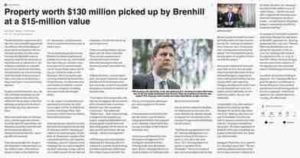 Read the Vancouver Sun article on Brenhill Development’s “sweet deal” here.
Read the Vancouver Sun article on Brenhill Development’s “sweet deal” here.
Some months later, the City of Vancouver prevailed at the B.C. Court of Appeals.

Peter Armstrong, owner of the Rocky Mountaineer, and founder / financier of ABC Vancouver
Now Peter Armstrong — who we know and very much like, who has pulled our behind out of the fire on more than one occasion, and who refers to us as his “favourite socialist” — will not be happy that we’re writing about him (reasonably, we can expect an irate call from Peter at some point today, as in “Why didn’t you call me to confirm with me what you’re writing about today?”).
But a man’s gotta do what a man’s gotta do (also, we hate to risk being lied to).

Founder Peter Armstrong’s Rocky Mountaineer offers unsurpassed luxury travel to discerning travelers
Now, Peter Armstrong — a pulled himself up by his bootstraps east end kid made good (we share a history as ‘east end kids’) — for many years was president of Vancouver’s oldest and most successful civic party, the Non-Partisan Association.
That is, until some dastardly folks staged a coup, taking over Peter’s beloved Non-Partisan Association in his absence, as he sailed his yacht to visit his good friend, Lululemon founder Chip Wilson, at his luxurious, well-appointed villa in Italy.

The consequence of the coup? Four of five NPA electeds resigned from the party.
And what became of the now former Non-Partisan Association Board members, who succeeded in killing the NPA, which party secured only, a paltry, unimaginably small 2.3% of the vote, when voters went to the polls in October 2022?
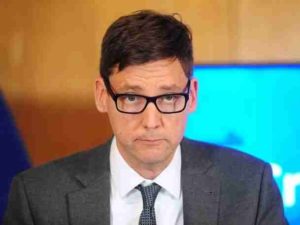
“Raymond, do you really think I’ll win re-election in Point Grey when we go to the polls in October?”
Premier David Eby will be heartened to know that these same far-right-of-centre nimrods are currently running the show with the nascent B.C. Conservative Party.
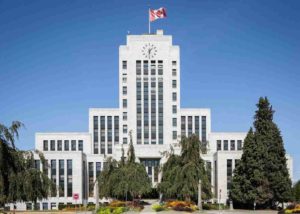
VanRamblings readers won’t be surprised to learn that ABC Vancouver founder, financier and Ken Sim backer, Peter Armstrong — as was the case with Joel Solomon, Vision Vancouver, and Mayor Gregor Robertson — has also created a secretive, behind-the-scenes Mayoral Advisory Committee, said committee comprised of developers, but mostly Peter and his very good friend, Chip Wilson.

A narrative, related to us recently by a very reliable VanRamblings source …
“Ken Sim ‘disappeared’ for a week this past autumn.
No one, save his family, knew where he was. In fact, Ken Sim was on board Peter Armstrong’s yacht, sailing up the west coast of British Columbia.
When Sim arrived back in town, returning to the Mayor’s office, he consulted with his Chief of Staff, Trevor Ford, after which the Mayor called in the ABC Park Board electeds to inform them of his decision to abolish the independent, elected Vancouver Park Board, leaving his now former ABC Park Board Commissioners in the room with Mr. Ford and David Grewal to explain details, and what would happen going forward.
Soon after, now former ABC Vancouver Park Board Commissioners Scott Jensen, Brennan Bastyovanszky and Laura Christensen made the decision to sit on Park Board as independents.
Subsequently, Sim called a press conference to announce his intention to eliminate the 133-year-old elected body, the much cherished, independent, and beloved Vancouver Park Board.”
The more things change, the more things stay the same.
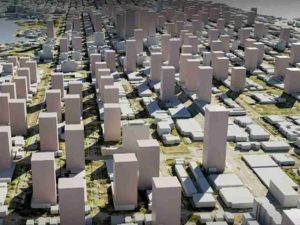
Whether it’s developer Mayor Tom Campbell in the late 60s, or Joel Solomon and Gregor Robertson for a 10-year period when Vision Vancouver was at the seat of power at Vancouver City Hall, or in these latter days, with an avuncular — but dare we say, avaricious — Peter Armstrong and Chip Wilson, we who call Vancouver home are reminded yet again, and much to our consternation, this is not our city, for Vancouver is owned lock, stock and barrel by the developer class.

